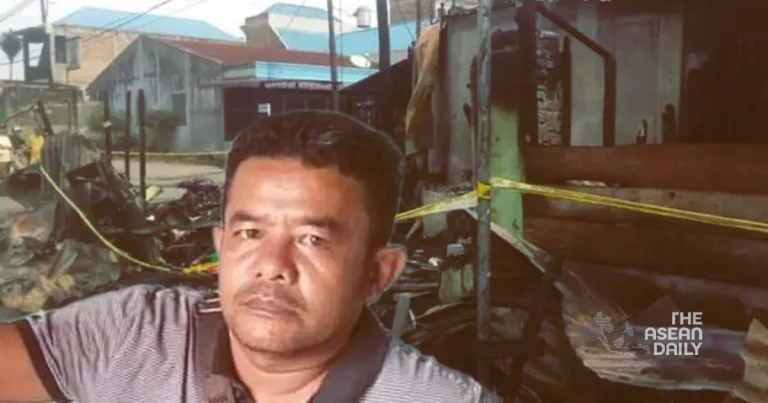9-7-2024 (JAKARTA) The untimely and suspicious demise of Rico Sempurna Pasaribu, a 40-year-old Indonesian television journalist, along with three of his family members, has ignited a fierce debate about press freedom, corruption, and the precarious financial situation of reporters in the Southeast Asian nation.
Pasaribu, who worked for the Medan-based online media outlet TV Tribrata, met his tragic end on 27 June when his wooden house in Karo, North Sumatra, was engulfed in flames. The fire claimed not only his life but also those of his 48-year-old wife, 12-year-old son, and three-year-old grandson.
The incident has drawn widespread attention due to its timing, coming just days after Pasaribu had reported on a local gambling ring allegedly supported by a military official. This sequence of events has led to speculation about possible foul play, with major journalistic organisations in Indonesia suggesting that Pasaribu and his family may have been targeted by corrupt officials.
Erick Tanjung, national coordinator for the Committee on Safety for Journalists (KKJ), has called for a thorough investigation. “We implore the police, armed forces, and other law enforcement agencies to work diligently and earnestly to uncover the truth behind this case and provide Rico’s family with the closure and justice they so desperately need,” Tanjung stated.
However, the case has taken an unexpected turn as the Alliance of Independent Journalists (AJI) Medan Chairman, Cristison Sondang Pane, revealed that their preliminary investigation uncovered potential ethical breaches by Pasaribu. “Our initial findings suggest that Rico had been receiving weekly stipends from the gambling ring to suppress stories about their operations, at least initially,” Pane disclosed.
While condemning any potential violence against journalists, Pane emphasised that such unethical practices are unfortunately common among Indonesian journalists, often driven by financial necessity. He pointed out that many reporters, like Pasaribu, earn between 800,000 and 1 million rupiah per month (approximately S$66-S$82), which is merely a third of the provincial minimum wage in North Sumatra.
This revelation has brought to light the broader issues plaguing Indonesia’s media landscape. A 2023 AJI study involving 423 journalists found that half of them were paid below the minimum wage, with over 10% required to earn commissions from advertisement sales. The study also exposed a dismal 11.2% compliance rate among media companies in granting female journalists paid maternity leave, despite it being mandatory under Indonesian labour laws.
The case has reignited discussions about past incidents where journalists reporting on sensitive issues met mysterious ends. Social media users drew parallels with the 1996 murder of Fuad Muhammad Syafruddin, known as Udin, a case that remains unsolved to this day.
As the investigation into Pasaribu’s death continues, the incident has become a rallying point for media reform in Indonesia. Journalists’ associations are calling for stricter enforcement of wage regulations and an overhaul of the industry to foster greater professionalism and ethical conduct.
The North Sumatra police have pledged their commitment to solving the case, establishing a community hotline for tips and information. Meanwhile, Reporters Without Borders (RSF) ranked Indonesia 111th out of 180 countries in its 2024 press freedom index, a slight decline from its 2023 position.




